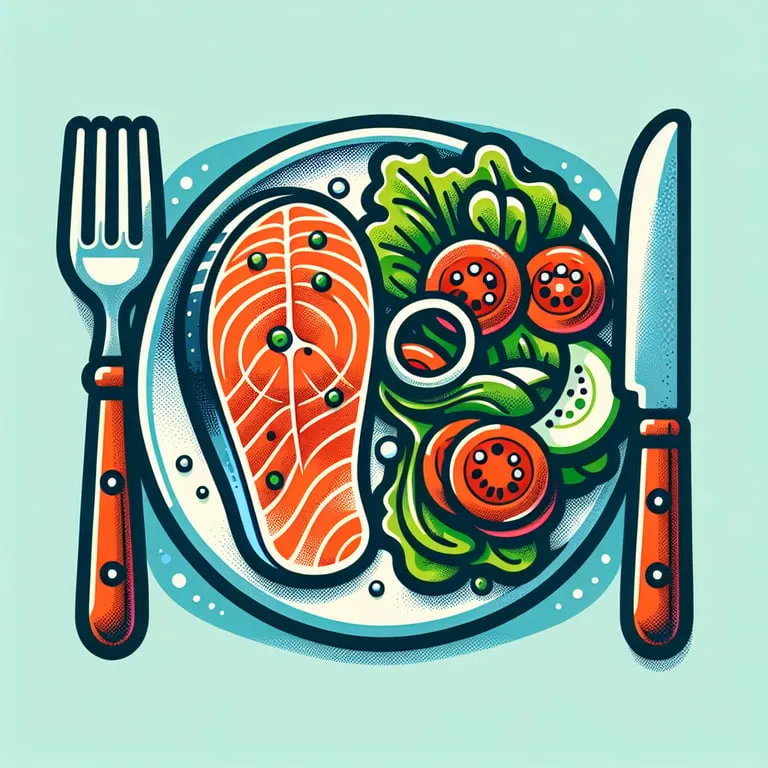
Diving Deep: Pescatarian vs. Vegetarian Diets in 2025
Hey there, health-conscious friends! So you’re thinking about making a change to your diet, huh? That’s fantastic! Maybe you’re considering cutting back on meat for ethical reasons, health benefits, or to help our lovely planet. Two popular choices are pescatarian and vegetarian diets. But what’s the real difference, and which one is right for you? Let’s dive in and explore these delicious and nutritious options!
Understanding the Basics: What Sets Them Apart?
- Vegetarianism: This dietary approach focuses primarily on plant-based foods like vibrant veggies, juicy fruits, hearty grains, and protein-packed legumes. Think colorful salads, comforting lentil soups, and flavorful veggie burgers. Meat, poultry, and typically gelatin and lard are off the menu.
- Pescatarianism: Similar to vegetarianism, pescatarians enjoy all the goodness of plant-based foods but also include fish and other seafood in their diet. This adds a delicious dimension with dishes like grilled salmon, shrimp scampi, and tuna salads.
Health Benefits: A Bounty of Goodness!
Both diets offer amazing health perks, but they have slightly different strengths.
- Heart Health Heroes: Both diets can be champions for your heart! Cutting back on red meat can significantly lower cholesterol and blood pressure, reducing the risk of heart disease and stroke. Pescatarians get a bonus boost from those omega-3 fatty acids found in fatty fish like salmon and mackerel. These amazing fats are known to reduce inflammation and improve insulin sensitivity.
- Cancer Risk Reduction: Studies suggest that both vegetarian and pescatarian diets are linked to a lower risk of certain cancers, including colorectal and prostate cancers. This might be due to the higher intake of antioxidants and fiber from plant-based foods.
- Diabetes Management: Vegetarian diets, in particular, have been shown to help manage and prevent type 2 diabetes, likely due to their positive impact on blood sugar control and insulin sensitivity.
Weighing the Considerations: Navigating the Nuances
Before making a switch, it’s important to be aware of some potential challenges.
- Nutrient Deficiencies (Vegetarianism): Vegetarians need to be mindful of getting enough vitamin B12, iron, zinc, calcium, and vitamin D, as these nutrients are most readily available in animal products. Careful meal planning and possibly supplementation can help bridge the gap.
- Mercury Concerns (Pescatarianism): While fish is incredibly healthy, some types can contain mercury. Sticking to low-mercury options like salmon, shrimp, and cod, and limiting high-mercury fish like swordfish and king mackerel, is key.
- Environmental Impact: Both diets are generally more eco-friendly than meat-heavy diets. However, overfishing is a real concern. Opting for sustainably sourced seafood is crucial for minimizing your environmental footprint as a pescatarian.
Making the Transition: Tips for Success!
Ready to embark on your plant-forward journey? Here’s how to make the switch smoothly:
Gradual Changes, Big Impact
- Start slow: Don’t feel pressured to go completely meat-free overnight! Begin by incorporating a few meatless meals into your week and gradually increase the frequency.
- Explore new recipes: The world of plant-based cooking is incredibly diverse and flavorful! Experiment with different cuisines, ingredients, and cooking methods to keep things exciting.
- Find your protein powerhouses: Whether you’re vegetarian or pescatarian, ensure you’re getting enough protein. Beans, lentils, tofu, nuts, seeds, and of course, fish (for pescatarians) are all excellent sources.
Expert Advice: Seek Support
- Consult a Registered Dietitian: A registered dietitian can provide personalized guidance on creating a balanced and nutritious meal plan that meets your specific needs and preferences. They can also help you address any nutrient deficiencies.
A Deeper Dive into the Science:
- Omega-3s: Eicosapentaenoic acid (EPA) and docosahexaenoic acid (DHA), found in fatty fish, are essential for brain health, reducing inflammation, and improving cardiovascular health. ALA, the plant-based omega-3, can be converted to EPA and DHA, but the conversion rate is limited.
- Vitamin B12: This crucial vitamin plays a vital role in nerve function and red blood cell production. It’s primarily found in animal products, making supplementation often necessary for vegetarians.
- Iron: Heme iron, found in animal products, is more easily absorbed than non-heme iron, found in plants. Pairing non-heme iron sources with vitamin C can enhance absorption.
Ultimately, the “best” diet is the one that aligns with your individual values, health goals, and lifestyle. Whether you choose vegetarianism or pescatarianism, focusing on whole, unprocessed foods and seeking professional guidance when needed will set you on the path to a healthier and happier you! So, are you ready to take the plunge?! 😊